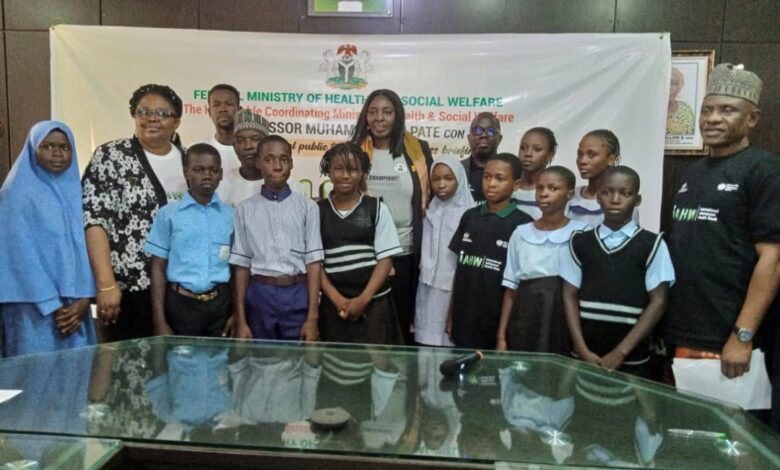
The Federal Government has announced its decision to reintroduce the School Health Program to cater for the physical and mental health needs of Adolescents in the country.
Coordinating Minister of Health and Social Welfare, Prof. Muhammad Pate disclosed this on Thursday, October 10, 2024 while fielding questions from Adolescents at a press briefing to mark this year’s International Adolescent Health Week (IAHW) in Abuja.
Pate who was represented by the Permanent Secretary of the Ministry, Daju Kachollom explained that the School Health Program would teach adolescents how to prioritise and take care of their physical and mental health while paying attention to their hygiene and nutrition.
The 2024 International Adolescent Health Week with the theme, “Thriving, Not Surviving: Building Adolescents’ Resilience,”
According to him, the 2024 International Health Week with theme, “Thriving, Not Surviving: Building Adolescents’ Resilience,” was a call to action, to ensure that the young people of today are growing, flourishing, and equipped to navigate life’s challenges with resilience, strength and confidence.
The Minister explained that adolescence was a critical stage of life, a time of rapid physical, emotional, and mental development. He however said it was also a period marked by significant vulnerability.
“They face challenges ranging from mental health issues, gender-based violence, substance abuse, and risky sexual behaviors, bullying in addition to structural barriers like poverty, poor access to quality healthcare, and lack of education.
“As we gather here today, remember that adolescents are not merely our future but a vital part of our present. Their health and well-being will determine the trajectory of our nation’s progress. Ensuring their health and resilience is not just an investment in their personal futures but an investment in the future of our communities, our economy, and, indeed, our country”, he said.
The Minister therefore informed that, “Our role, as policymakers, health practitioners, educators, and community leaders, is to create environments that nurture resilience by providing adolescents with access to comprehensive healthcare, mental health support, quality education, and safe spaces by ensuring they have the tools, knowledge, and support they need, to not only survive but thrive”.
He said one of the most pressing issues facing our adolescents today is mental health disorders such as depression, anxiety, etc, which are on the rise, with many young people suffering in silence due to stigma, lack of awareness, and insufficient access to care. The Ministry of Health is committed to breaking this silence.
To address these issues, he disclosed that the ministry had established the National Mental Health program which is saddled to roll out policies to raise awareness about mental health, reduce stigma, and provide adolescents with the support and care they need. Adding that Mental health must be treated with the same urgency and importance as physical health.
Responding to the development, Executive Director, GEM Hub Initiative, Oyeyemi Pitan said, “as civil society organisations, we commend the Ministry’s commitment to introducing a School Health Program. This is a vital step toward improving the well-being of students across the country.
However, to ensure the success of this initiative, it is crucial that the program adopts a comprehensive, inclusive approach that addresses physical, mental, and sexual and reproductive health, while promoting nutrition and overall well-being. It is also crucial for this to be systematic and leverage building the capacity of existing teachers to support this initiative for sustainability and coverage to make most of limited resources.
“Gem Hub and other CSOs are poised to support the Ministry in advocating for stakeholder consultations to ensure that the voices of students, parents, teachers, and healthcare providers are included. We will also push for sustainable funding and equitable access to health services, particularly for marginalized groups such as children in rural areas, urban slums, and those with disabilities”.
On her part, Permanent Secretary of the Ministry who was represented by the Director, Family Health Department, Dr. Binyerem Ukaire said commemoration of the IAHW was not just symbolic but served as a reminder of their collective responsibility to protect, nurture, and empower the adolescents.
Kachollom therefore encouraged all health professionals, policymakers, educators, parents, the media and young people to work together toward a future where every adolescent could thrive.






